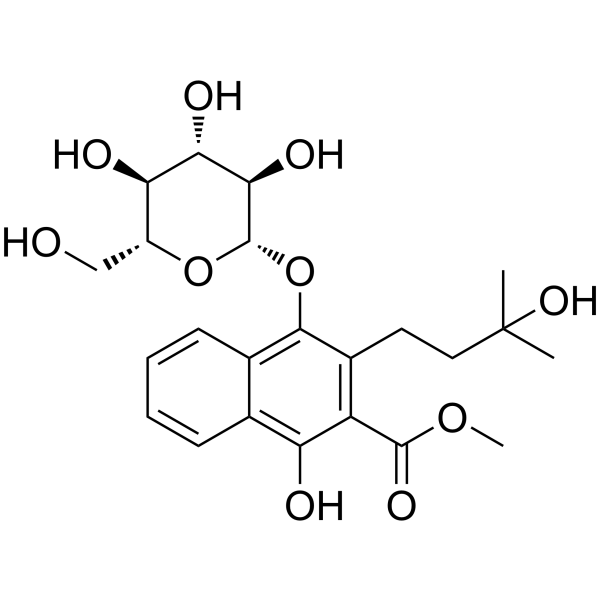 Home -
Products -
Others -
Other Targets -
2-Naphthalenecarboxylic acid, 4-(D-glucopyranosyloxy)-1-hydroxy-3-(3-hydroxy-3-methylbutyl)-, methyl ester
Home -
Products -
Others -
Other Targets -
2-Naphthalenecarboxylic acid, 4-(D-glucopyranosyloxy)-1-hydroxy-3-(3-hydroxy-3-methylbutyl)-, methyl ester

2-Naphthalenecarboxylic acid, 4-(D-glucopyranosyloxy)-1-hydroxy-3-(3-hydroxy-3-methylbutyl)-, methyl ester
CAS No. 125906-48-1
2-Naphthalenecarboxylic acid, 4-(D-glucopyranosyloxy)-1-hydroxy-3-(3-hydroxy-3-methylbutyl)-, methyl ester ( )
Catalog No. M32259 CAS No. 125906-48-1
2-Naphthalenecarboxylic acid, 4-(D-glucopyranosyloxy)-1-hydroxy-3-(3-hydroxy-3-methylbutyl)-, methyl ester (compound 3) is a naturally occurring substance found in the dried roots of Rubia cordifolia.
Purity : >98% (HPLC)
 COA
COA
 Datasheet
Datasheet
 HNMR
HNMR
 HPLC
HPLC
 MSDS
MSDS
 Handing Instructions
Handing Instructions
| Size | Price / USD | Stock | Quantity |
| 5MG | 410 | In Stock |


|
| 50MG | Get Quote | In Stock |


|
| 100MG | Get Quote | In Stock |


|
Biological Information
-
Product Name2-Naphthalenecarboxylic acid, 4-(D-glucopyranosyloxy)-1-hydroxy-3-(3-hydroxy-3-methylbutyl)-, methyl ester
-
NoteResearch use only, not for human use.
-
Brief Description2-Naphthalenecarboxylic acid, 4-(D-glucopyranosyloxy)-1-hydroxy-3-(3-hydroxy-3-methylbutyl)-, methyl ester (compound 3) is a naturally occurring substance found in the dried roots of Rubia cordifolia.
-
Description2-Naphthalenecarboxylic acid, 4-(D-glucopyranosyloxy)-1-hydroxy-3-(3-hydroxy-3-methylbutyl)-, methyl ester (compound 3) is a naturally occurring substance found in the dried roots of Rubia cordifolia.
-
Synonyms
-
PathwayOthers
-
TargetOther Targets
-
Recptor——
-
Research Area——
-
Indication——
Chemical Information
-
CAS Number125906-48-1
-
Formula Weight466.5
-
Molecular FormulaC23H30O10
-
Purity>98% (HPLC)
-
Solubility——
-
SMILES——
-
Chemical Name
Shipping & Storage Information
-
Storage(-20℃)
-
ShippingWith Ice Pack
-
Stability≥ 2 years
Reference


-
thermospermine
Thermospermine is a structural isomer of spermine and plays a role in the repression of xylem differentiation. Thermospermine can be used in studies about acting as a plant growth regulator and serving in the control of wood biomass production.
-
Linaprazan glurate
Linaprazan glurate inhibits exogenously or endogenously stimulated gastric acid secretion. Linaprazan glurate can be used in studies about gastrointestinal inflammatory diseases and peptic ulcer diseases.
-
Sulfo-SMCC sodium
Sulfo-SMCC sodium is a commonly used hetero-bifunctional, non-cleavable ADC crosslinker bearing N-hydroxysuccinimide (NHS) ester and maleimide groups to react with primary amines and sulfhydryl groups, respectively.



 Cart
Cart
 sales@molnova.com
sales@molnova.com

